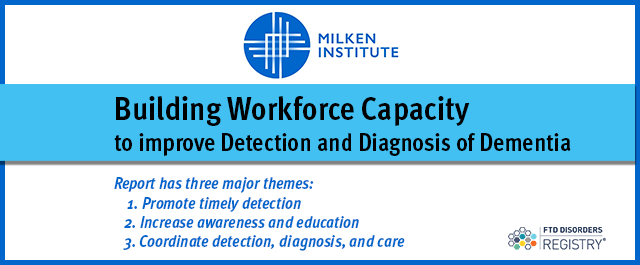PRESS & NEWS
2021 Milken Report Offers Recommendations to Increase Early Detection and Diagnosis of Dementia

New recommendations from the Milken Institute identify ways to engage direct care workers in improving dementia detection and diagnosis in healthcare settings, including specialty care. The recommendations are part of the 2021 report “Building Dementia Workforce Capacity to Improve Screening and Diagnosis.” The report details three major themes: promoting timely detection of cognitive impairment in primary care…
New recommendations from the Milken Institute identify ways to engage direct care workers in improving dementia detection and diagnosis in healthcare settings, including specialty care. The recommendations are part of the 2021 report “Building Dementia Workforce Capacity to Improve Screening and Diagnosis.”
The report details three major themes:
- promoting timely detection of cognitive impairment in primary care settings
- increasing awareness and education of healthcare professionals and consumers
- broadening access and interprofessional coordination in detection, diagnosis, and care delivery
In December 2020, leaders across industry, government, research, advocacy, philanthropy, health systems, and community-based organizations met to look at ways to build a dementia-capable workforce. The report is the result of their discussions.
Dementia is underdiagnosed or caught in its later stages, according to the report authors. The report estimates disease could be undiagnosed in 40% to 60% of adults with probable dementia. They noted that this is a growing problem which will create the need for a larger workforce.
Additionally, the report states that “Individuals with dementia can face medication mismanagement, burdensome out-of-pocket costs for care, and continuation of risk factors that can accelerate cognitive decline.”
The report was produced by the Alliance to Improve Dementia Care, which is a part of the Milken Institute’s Center for the Future of Aging. The Alliance is working to develop recommendations to improve care for individuals diagnosed with dementia, and it seeks to close gaps in care, which includes building a dementia-capable workforce.
Barriers, Benefits, and Recommendations
The report notes there are multiple factors that create barriers which can prevent the early detection and diagnosis of dementia. These include:
- Primary care physician reluctance
- Structural barriers
- Complex diagnostic process
- Shortage of dementia specialists
- Stigma
Timely detection and diagnosis of adults at higher risk for dementia might reduce risks, possibly delay onset, and may enable treatments to have an effect. Additional benefits include:
- Planning patient care and arranging advance care
- Using available drug therapies and drug interactions
- Enrolling in clinical trials
The report also discusses six recommendations:
- Create the business case to demonstrate the return on investment (ROI) for timely detection and diagnosis of cognitive impairment within the primary care setting.
- Promote routine utilization of structured cognitive assessments during the Medicare Annual Wellness Visit.
- Accelerate incorporation of available and recognized training and toolkits into primary care team clinical workflows to augment detection and diagnosis.
- Address stigma surrounding dementia by raising awareness of the benefits to early detection and diagnosis and creating consumer demand for and expectation of routine cognitive assessment.
- Facilitate expansion of and access to cognitive assessment strategies to include age-friendly clinical and non-clinical home- and community-based settings.
- Promote long-term coordination and partnerships among medical and non-medical stakeholders to elevate detection, diagnosis, and care delivery strategies.
“Meeting the needs of a growing number of individuals and their families affected by dementia requires multifaceted awareness, training, coordination, and health system and community infrastructure,” the report concluded
Together we can find a cure for ftd
The FTD Disorders Registry is a powerful tool in the movement to create therapies and find a cure. Together we can help change the course of the disease and put an end to FTD.
Your privacy is important! We promise to protect it. We will not share your contact information.



